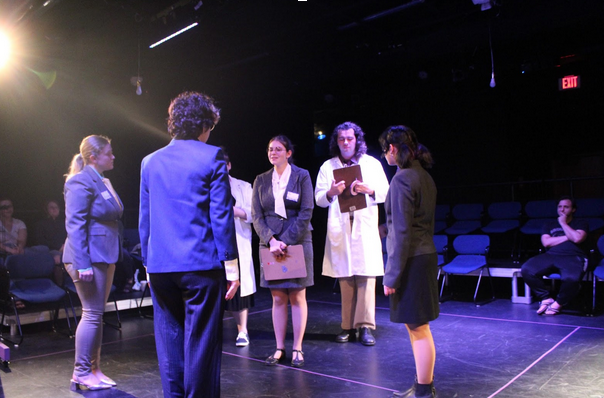For the second show of the [performance @ new college] 2022-2023 season, Assistant Professor of Theater, Dance and Performance Studies (TDPS) Diego Villada directed a double-feature: A Game by Dennis E. Noble and The Girl Who Was Asked to Turn Blue by Ev Miller. Both one-acts offered commentary about nationalism, authoritarianism and other social issues highly relevant to the New College community at this time. The shows were performed inside the Black Box Theater (BBT) in Hamilton “Ham” Center from Feb. 2 to 5, and afterward, Villada sat down with a Catalyst reporter to discuss the ways that theater forms community, offers catharsis and provides insight during tense political and cultural moments.
Villada has been a faculty member since Fall 2018, and has helped to produce every single [performance @ new college] show since then—whether that be through directing, serving as co-artistic director, producer or by orchestrating fight choreography and intimacy training for actors.
Both The Game and The Girl Who Was Asked to Turn Blue were selected for this season in Spring 2022, and it served as several student actors and technicians’ Independent Study Project (ISP). Villada also added that both of these shows are typically performed at the high school level, and so wanted the opportunity to perform them at the college level “with higher stakes and with adult actors who are trained.”
“Each show was a one-act, independent of the other one, but I put them together because I thought that they spoke to each other in ways that were constructive, both for my students and my audience,” Villada said.
A Game tells the story of a psychological experiment gone horribly wrong, as three participants are locked in a room with tape on the floor dividing the space into three equal sections. They are instructed to repeat the phrase, “This is my land. It is mine. It is beautiful, and it is mine,” at certain intervals, and as they do, they begin to turn on each other and grow increasingly territorial and violent. Meanwhile, The Girl Who Was Asked to Turn Blue is about Tracy Logan, who is suddenly transported to a world where everything and everyone is blue—a world free from diversity, free expression or true fulfillment.
“It is a piece that focuses on the involvement of the state or authority on the individual,” Villada explained. “And so, in order to fit into this society, Tracy Logan has to decide whether or not they wish to be ostracized or whether or not they wish to join the society as a whole member.”
Villada also said that The Girl Who Was Asked to Turn Blue comes with alternative endings: one where Tracy chooses to assimilate, and one where she chooses to retain her identity but is shunned for it. Villada had originally intended to perform both endings, but later chose to only perform the one where Tracy agrees to turn blue.

Because the shows were selected so far in advance, Villada also said that the current campus climate did not influence his approach to these shows. But, between the recent removal of Dr. Patricia Okker from her role as New College President by the new Board of Trustees (BOT) and the ongoing community resistance, he did acknowledge the relevance they have for New College at this time.
“What it influenced was the meaning for the audience, because the zeitgeist and the references of their own lives happens to be similar to what they’re seeing onstage, and very recent and also very much anchored in the geography of this campus,” he said.
“It just so happens that for The Girl Who Was Asked to Turn Blue, it matches a lot of what is going on and turned out to be extraordinarily timely,” Villada continued. “In the show, the powers that be give an ultimatum to the main character: become one of us, or we don’t want you.”
Villada also spoke about the comedy aspect of both of these shows—for instance, how the three participants in A Game are initially absurdist characters, “Three Stooges style” before gradually becoming more like embodiments of nationalism. He explained that the choice to lean into the more comedic moments of shows that covered such heavy topics came down to something called the “Brechtian approach,” after famous German playwright Bertolt Brecht. This refers to moments that allow the audience to “achieve catharsis,” or to be reminded that they exist separately from the grim scenarios depicted in the theater.
“There are some artists that believe that these Brechtian techniques need to be extraordinarily serious in order to be effective, but I am not like that,” Villada said. “I am of the mind that Brechtian techniques are best when combined with comedy, because they take the audience out of the play, they let them laugh, and then they continuously invite them to be in it by having the pill of social commentary go down easier.”
In the spirit of New College’s own unique academic and artistic opportunities, Villada also emphasized the open nature of both TDPS and [performance @ new college], and how any student of any Area of Concentration (AOC) is invited to participate.
“No experience is necessary, we may even have an informational session the night before [auditions],” he said. “The goal of that is that we are offering to the campus not only the art itself. We want to be a part of the cultural offerings that the campus provides students, faculty, staff and community.”

